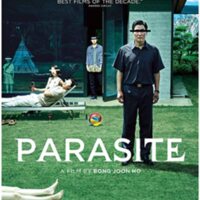Browse Exhibits (9 total)
Allen Warren | Life's a Peach: The Convergence of Sexuality and Class in Guadagnino's Call Me by Your Name
Call Me by Your Name (2017) became famous for its “peach scene,” though the orchard around the Perlmans’ villa where this fruit thrives could not have grown on its own. Distinctions of class and a parasitism by the most affluent of their workers cultivate the paradise where director Luca Guadagnino sets the blossoming romance between Elio and Oliver. Apricots are a clear metaphor for desire here, yet their prolificacy is only possible through the invisibility and silent intervention of other food items, from peas to latkes to water. Critics have pointed out the beauty of the Italian setting and its use as a temporary escape from heteronormative surveillance, as well as the way domestic workers flow in and out of scenes almost wordlessly. What these critics have missed is the connection these occurrences have in explaining how the working class have built (butdo not benefit from) this heaven on Earth, where the young male lovers may permit their bodies to act without restraint. While queer and class theories inform this discussion, my primary vehicle for interpretation will be food, both for its prominent place in the movie and for the ways it parallels the class structure at the villa. I find the film quietly reflects on the levels of economic privilege and exploitation needed to experience the paradise it depicts, with the usurpation of food in many scenes helping to remind the audience of the inability of this space to be wholly subversive.
Faculty Mentor: Dr. Emily Rutter
Department of English
Undergraduate
Emily Turner | The Parasite of Society
Food studies in media provide complex layers to the films that viewers quite literally consume, a fact complicated depending on how one analyzes food. Different theories, lenses, and contexts can change how food is used in film, much like how using different ingredients in a recipe can alter the final product. But why does food matter in film, and how do directors use food to create meaning? Food is often employed to symbolize greater significance or to prove a point that a director wants to assert in their film. For example, Bong Joon-ho’s film Parasite (2019) utilizes food to symbolize social class: food is a vehicle in this film to show both the stark divide between the upper and lower classes and how such economic disparity can be perilous for society. Bong does this to warn viewers that class inequality is unjust by demonstrating how greed within different social classes warrants grave consequences. Ultimately, Parasite concludes with the patriarch of the ultra-wealthy Park family deceased while the extremely impoverished Kim family is divided, still dangerously poor, and suffering the death of their daughter/sister. While these may be extreme conclusions to draw from the film, Parasite aims to warn its viewers of the greed between social classes that could lead to such dismal ends. Bong accomplishes this through the placement of food: it symbolizes the class divide that each family struggles with in different ways.
Faculty Mentor: Emily Rutter
Department of English
Undergraduate
Ian Roesler | The Texas Chain Massacre, Cannibalism, and Hillbilly Horror

This is a presentation about the Texas Chain Saw Massacre.
Faculty Advisor: Dr. Emily Rutter
Department of English
Undergraduate
Jessica (Shelby) Harrison, Julie Steele, Andrea Mohler, Ben Jett, June Cooper | Designing and Publicizing The Digital Literature Review
Explaining the process of designing, formatting and publicising the academic journal, The Digital Literature Review. Also known as the DLR, we as a student run journal edited and produced the journal with the theme of “Food Matters in Literature and Culture”. Through a process of teamwork and dedication the journal was advertised to the public through Instagram and Twitter. However, we will be discussing the whys and whats of the choices we made while creating the online journal. While also discussing the real-world experience that an immersive learning course, such as this one can impact the future of the students. What experiences we developed and how we can bring them into our future careers and how other students can benefit in joining these immersive learning courses available through Ball State University.
Faculty Mentor: Dr. Emily Ruth Rutter
English Department
Undergraduate
Kaila Henkin | "Redirecting the Blame
This presentation explores how white power structures use Black women such as in Kiese Laymon's narrative Heavy as scapegoats for the blame of generational and current trauma resulting in abusive tendencies and food insecurities in Black communities. This research presentation also delves into triple consciousness and America's consumption of Black women in and outside of Laymon's novel, including the most recent spark of Black Lives Matter protests this previous summer.
Faculty Mentor: Emily Rutter
Department of English
Undergraduate
Martina Schiavo | Benefits on Listening and Speaking in Learning English through International Programs’ Activities
The paper discusses the alignment of learning objectives with speaking and listening skills, materials, and assessments. They are developed through participation in international students' presentations with their faculty studying at the Intensive English Institute (IEI). These presentations are part of social events organized by the International Office called Rinker Center for International Program (RCIP) at Ball State University in Muncie, Indiana. The goal is to improve speaking and listening skills, the most difficult to develop in classroom activities. The methodology was based on a survey measuring the efficacy of the objectives addressing speaking and listening skills. The survey results conducted among instructors provided clear evidence that future participation in these events will consolidate cultural knowledge, pronunciation, and taking notes skills in front of a speaker despite time constraints of the IEI. These results were valid in alignment with the learning objectives of speaking and listening. Regarding the material to prepare ahead and the assessments, relevant ideas were pointed out both in the close-ended and open-ended questions. This research is framed in the more general importance of a collaboration between the English Institute of a university and the International Office because many international students attending a university in the US at least in Indiana attend the English Institute. This collaboration becomes essential in building students’ intercultural competence and communicative skills to succeed both in real life and at the academic level.
Faculty Mentor: Megumi Hamada
Department of English
Graduate
Nilima Hakim Mow | Bangla-English Code-switching on Facebook: Features and Frequency
The world has been exposed to English in wider measure than ever before due to its huge role in technology and electronic communication. Due to this extensive contact with English, variation in the language in social media has resulted. Code-switching is one such result.
The focus of this exploratory study is to analyze the nature of Bangla-English code-switching in language use in the social medium Facebook, by Bangla speakers from Bangladesh. In order to do that, this study examines the features and frequency of Bangla-English code-switching on Facebook. Specifically, it analyzes the use of lexical items, phrases, and the frequency of switching.
Bangla-English code-switching has been explored very little. Alam (2006) points out a few factors that motivate code-switching. Khadim (2014) investigates the motivation behind this practice focusing on the specific situations that might encourage code-switching. Tasnim (2018) investigates the frequency of code-switching based on a very small amount of data. My study aims to fill some gaps in previous research by examining the main features of code-switching along with the frequency of the words and phrases used.
A mixed methodology has been used to fulfill the objectives of the research. Data was collected through a survey questionnaire and close observation. Ten active users of Facebook have been chosen as participants through the snowball method for close observation.
The data analysis yields result suggestive of the frequency and types of code-switching and their patterns of switching in language use on Facebook in terms of lexical, morphological, and syntactical properties.
Faculty Advisor: Elizabeth Riddle
English
Graduate
Taurice Hagemann | Food for the Dogs: Consumption and Wealth Inequality in Bong Joon-Ho's "Parasite"

This presentation analyzes the ways in which food throughout the film Parasite symbolizes the divide between rich and poor, using contemporary research to further build on how food is a signifier of class and wealth. From the less wealthy eating prepackaged foods, to the ignorance of wealth and privilege on the part of the upper classes, there is a clear indication throughout the film of food as a signifier of status and class. I take this divide and analyze its significance to the modern culture and society of South Korea, then further apply this to its relevancy in a modern United States. Parasite flourished in American society—both are countries wherein a capitalist ‘meritocracy’ rules for the most part, and an analysis of the culture around the film will show the ways in which the cultures that consumed this media are similar in their class divides.
Faculty Mentor: Emily Ruth Rutter
English
Undergraduate
Honors College
Vincent Ramos-Niaves | Eat the Rich: The Parasitic Relationship Between Socioeconomic Groups in Bong Joon-ho’s Parasite and Snowpiercer
A presentation of "Eat the Rich: The Parasitic Relationship Between Socioeconomic Groups in Bong Joon-ho’s Parasite and Snowpiercer" which has since been published in Ball State's Digital Literature Review offers insight into food studies in Bong Joon-ho's films.
Faculty Mentor: Dr. Emily Rutter
Department of English
Undergraduate
